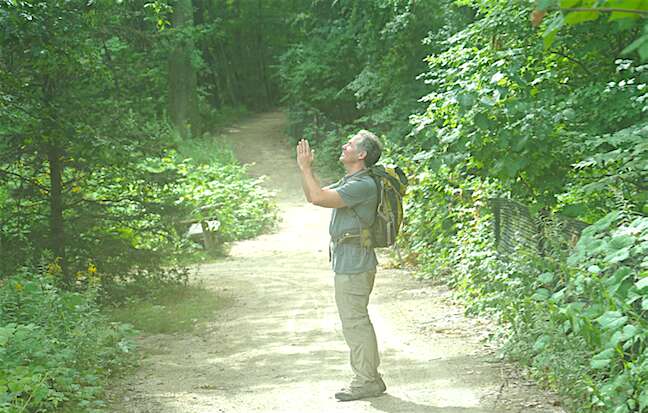Taking a study break in the local mountains: A chat with Chris Ives

Hiking, as alumnus Chris Ives’ new book Zen on the Trail explains, can be more than just a good way to exercise. It can open up a doorway to the divine.
Ives’ book is featured in the new issue of The Flame magazine — and so is the following chat about his experiences as a hiker and as a student at the university (then known as CGS) back in the 1980s.
***
When did you discover your love for hiking?
I was born the son of the local scoutmaster in my hometown of Litchfield in northwestern Connecticut, near where the Appalachian Trail meanders through that corner of the state. I started hiking as a small boy and, as I got older, I hiked a lot on my own and with my brothers and friends. After graduating from high school, I moved from Litchfield at the south edge of the Berkshires to Williamstown (Massachusetts) at the north edge, where, as a student at Williams College, I started backpacking, too.
As I outline in the Zen on the Trail prologue, my love of hiking and backpacking led me from there to an array of spectacular spots around the world. In recent years, however, I’ve stayed off airplanes to keep my carbon footprint down, and I’ve done most of my hiking in the White Mountains, which is several hours from my home in the Boston area.
What was your experience like as a doctoral student in Religion at CGU (then CGS)?
After I graduated from Williams, I studied and practiced Zen in Kyoto for five years. In 1981, I followed my mentor in Japan, Zen philosopher Masao Abe, to CGS where he joined the Department of Religion. My main intention was to continue studying with—and translating for—Abe; but once I landed in Claremont, I immediately became intrigued by the thought of Abe’s main Christian dialogue partner, theologian John Cobb. It was in large part through Cobb’s influence that I wrote my dissertation on Zen social ethics. Over the years my scholarly focus has continued to be on Zen ethics, and my recent research and writing on Buddhism and environmental ethics have been greatly informed by Cobb’s writings.

Did you ever hike any of our local mountains, such as Mt. Baldy?
I did a lot of hiking up on Mt. Baldy, and on Mt. San Gorgonio and other peaks in the San Gabriel Mountains. Sometimes I would go on shorter hikes, often up Icehouse Canyon near Mt. Baldy Village. With these jaunts I indulged my longstanding love of hiking while also giving myself a break from my academic work down the road in Claremont.
Are there spiritual experiences to be had on a nearby mountain like Mt. Baldy or does transformation require something grander and more exotic?
While the village of Mt. Baldy sits at 4,193 feet, Mt. Baldy itself tops out at 10,064 feet, tall and demanding enough to make me a humble hiker! Though impressive peaks like Baldy have impacted people across cultures, spiritual experiences and transformation can also happen in a small stand of trees on the edge of a suburban neighborhood or on a Central Park lawn in the middle of Manhattan.
One point I try to make in Zen on the Trail is that the driven-ness of many hikers to summit a peak or have an “epic” experience often makes it hard to shift from ego-driven doing mode to spirit-filled being mode. Perhaps mountains are most transformative when we view them as liminal spaces where we can slow down, pay attention, and be present to what is happening in and around us, even if we only get a mile up the trail.